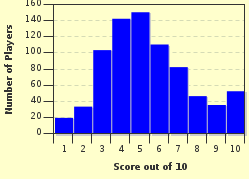Quiz Answer Key and Fun Facts
1. Everyone knows the word "Robot" but do you know what language it comes from originally?
2. Irish writer Bram Stoker wrote the story of the world famous vampire, Dracula. Vampire is not an English word, so which language does it come from?
3. Everyone knows that a "bistro" is a small restaurant serving simple meals that are affordable for everyone. What language influenced the name "bistro"?
4. Which of these languages is a probable origin for the word "pistol"?
5. Cheers! is what many people say when drinking a legal drug - alcohol. What language donated "alcohol" to the English speaking world?
6. What language is the origin of "dollar"?
7. "Genocide" is a word of Latin origin.
8. Which of these words is not of German origin?
9. What group of languages gives us "vodka"?
10. The English alphabet is based on Latin characters. What is the origin of figures (1234567890)?
Source: Author
marvo1330
This quiz was reviewed by FunTrivia editor
Bruyere before going online.
Any errors found in FunTrivia content are routinely corrected through our feedback system.

